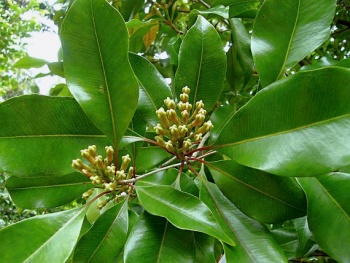Cloves
Other Names: Bourgeon Floral de Clou de Girofle, Bouton Floral de Clou de Girofle, Caryophylli Flos, Caryophyllum, Caryophyllus aromaticus, Clavo de Olor, Clous de Girolfe, Clove Flower, Clove Flowerbud, Clove Leaf, Clove Oil, Clove Stem, Cloves, Cloves Bud, Ding Xiang, Eugenia aromatica, Eugenia caryophyllata, Eugenia caryophyllus, Feuille de Clou de Girofle, Fleur de Clou de Girofle, Flores Caryophylli, Flores Caryophyllum, Gewurznelken Nagelein, Girofle, Giroflier, Huile de Clou de Girofle, Kreteks, Lavang, Lavanga, Oil of Clove, Syzygium aromaticum, Tige de Clou de Girofle
The clove is a pink flower bud of the clove tree that turns brown when dried. Cloves have a warm, sweet, and aromatic flavor and an oily compound that is vital to their medicinal and nutritional properties.
Cloves are indigenous to the Moluccas volcanic islands of Indonesia previously known as the Spice Islands. Today Zanzibar is the largest producer of clove and are also grown commercially in the West Indies, Brazil, Pemba, Sri Lanka, Madagascar, and India.
Special Precautions of Cloves
- Allergic reactions to clove and eugenol have been reported.
- Eugenol can be potentially dangerous when ingested in higher amounts. It is hepatotoxic and can have several dangerous side-effects.
- When using Clove Bud Oil, there is moderate risk for mucous membrane irritation, may inhibit blood clotting and pose a drug interaction hazard. It may cause embryotoxicity. There is a moderate risk of skin sensitization, and Tisserand and Young recommend a dermal maximum of 0.5%. They advise not to use topically on children age 2 or younger. Reading Tisserand and Young's full profile is recommended.
- Clove supplements should be avoided in children and pregnant or nursing women.
The benefits of Cloves are
- Cloves are an excellent source of manganese. They are a very good source of vitamin C, K, and dietary fiber. They are a good source of calcium, magnesium and selenium.
- Anti Fungal : Eugenol is a chemical compound extracted from the essential oil of cloves and other spices. Eugenol has been shown to be an effective natural anti fungal against the T. mentagrophytes and M. canis dermatophytes (tinia or ringworm), and although tea tree oil is a more effective anti fungal, a combination of tea tree oil and eugenol was found to be more effective. Tests have also demonstrated that essential oil of cloves to be effective against Candida albicans. The fungicidal potency of clove oil compares very well with that of the commercial antifungal drug nystatin, while providing for a less toxic, safe, and inexpensive alternative to commercial drugs without the risk of ever-increasing resistance shown by the target pathogens, toxicity problems at the increasing required doses, and problematic side-effects.
- anti-inflammatory : contains an anti-inflammatory chemical called eugenol.
- Anasthetic : Eugenol is the principal chemical component of clove oil and is used in dentistry due to its analgesic, local anesthetic, anti-inflammatory, and antibacterial effects. It is used in the form of a paste or mixture as dental cement, filler, and restorative material. Beta-caryophyllene, another component of clove oil, has also been shown to exhibit local anesthetic activity.Cloves can be used in relieving a toothache by placing a single clove on the aching tooth. Clove oil can also be used by soaking in some cotton wool and then placing the cotton wool on the aching tooth.
- Diabetes : USDA’s Richard Anderson reports that bayleaf, cinnamon, cloves, and turmeric all can treble insulin activity, hinting that as little as 500 mg might be enough to have some effect. A tea of 500 mg each of these spices, with coriander and cumin, should be enough to treble insulin activity, possibly helping in late-onset diabetes.
- Aphrodisiac : Extract of clove has been shown to enhance the sexual behavior of male mice. The results of the study resulted in a significant and sustained increase in the sexual activity of normal male rats, without any adverse effects. The results seem to support the claims for its traditional usage as an aphrodisiac.
- Mosquito Repellant : The natural oil of clove is a natural mosquito repellant and can give protection against mosquitoes for 4-5 hours.
- Cancer Prevention : Preliminary studies have suggested the chemopreventive potential of clove for lung cancer, and to delay and reduce the formation of skin cancer.
- Cancer : due to its high antioxidant rating, clove has substantial anti-cancer properties. In lab tests, isolated compounds of the spice were shown to suppress mutagenic cellular activity. Researchers found that the clove extract halted the activity and growth of the colon cancer cells, the breast cancer cells, the ovarian cancer cells, the liver cancer and the colon cancer cells. Meanwhile, the clove extract was not dangerous to the normal cells.
- Cardiovascular Health : The compound eugenol from cloves has been found to be a potent platelet inhibitor (prevents blood clots).
- Allergy : Clove Oil: has antihistamine properties. This essential oil is helpful in the treatment of dermatitis due to allergic reactions.
- Aromatherapy for Kapha and Vata Imbalance.
